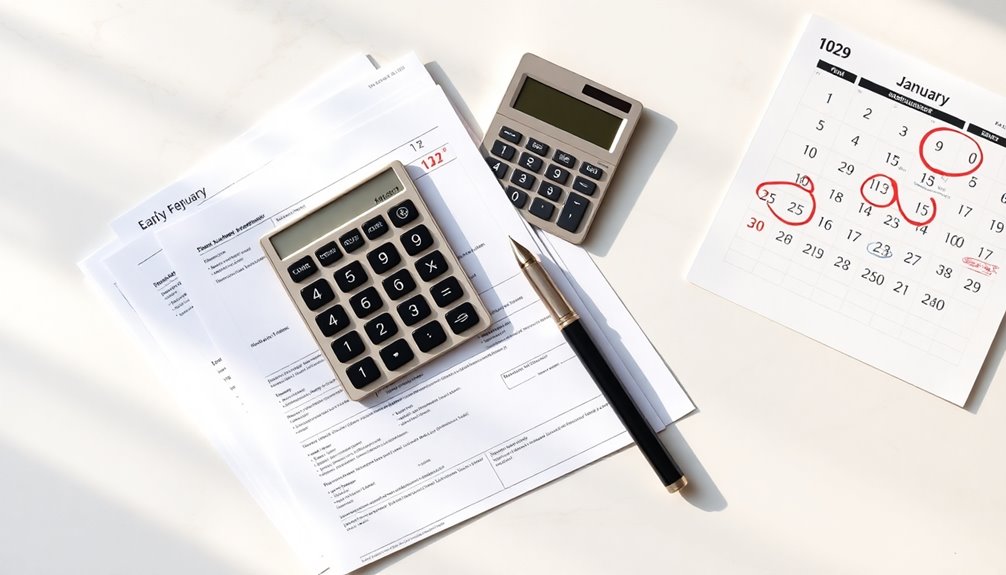You can file your taxes as early as mid-to-late January. The IRS typically starts accepting returns between January 15 and January 31. It's a smart move to prepare in advance by gathering your necessary documents, like W-2s and 1099s, which you should receive by January 31. Early filing not only reduces stress but also speeds up your refund process. Plus, getting your return in early minimizes the risk of late penalties and identity theft. If you're curious about other important dates and tips, there's plenty more to know about maximizing your tax season experience.
Key Takeaways
- Tax season officially starts between January 15 and January 31, 2025, as announced by the IRS.
- You can prepare your tax returns early, but filing is only allowed after the IRS opens e-filing.
- Gather necessary documents like W-2s and 1099s, which must be received by January 31.
- E-filing your return as soon as the IRS accepts submissions can expedite your refund process.
- Filing early also reduces the risk of penalties and identity theft during tax season.
Tax Season Start Date

When does tax season actually kick off? Tax season typically starts in mid-to-late January, and for the 2025 tax season, you can expect the IRS to begin accepting returns between January 15 and January 31.
The exact date will be announced by the IRS in early January, so keep an eye out for that update.
You can prepare your tax returns before this official start date, but keep in mind that the IRS won't process them until tax season officially kicks off. Many tax software programs and professionals will hold onto completed returns, ready to submit them as soon as the IRS opens the gates.
Remember, January 15 is also a key date for your estimated tax payments, as it's the deadline for the fourth quarter of 2024. Additionally, January 31 is when employers must send out W-2 forms and certain 1099 forms. This date is significant because it coincides with the individual tax returns due on April 15, 2024.
Lastly, tax season generally runs from January 1 to April 15, so make sure you're aware of this timeline to avoid any last-minute rush or penalties!
Preparing Your Tax Returns

How can you ensure a smooth tax filing experience? Start preparing your tax returns early, even before the official tax season kicks off. Tax software and professionals can hold onto your completed return and submit it as soon as the IRS opens for filing.
Gather all necessary forms and information, and don't wait for key documents like Form W-2 or Form 1099, which employers must issue by January 31. Waiting for these documents helps ensure your return is accurate and complete, reducing the risk of IRS inquiries or the need for amended returns. Additionally, early preparation can help identify any missing documents, allowing you to resolve issues sooner. Plus, filing early relieves the stress of last-minute deadlines, speeds up the refund process, and minimizes the chances of penalties. By filing early, you also reduce the risk of tax return identity theft, which is a growing concern during tax season.
If you choose to e-file, you'll further expedite your refund. Remember, inaccuracies or discrepancies can delay your refund, so double-check everything before submission. By taking these steps, you can navigate the tax filing process with ease and confidence.
Necessary Filing Documents

Gathering the right documents is key to a successful tax filing experience. First, you'll need your W-2 forms from your employer, which must be provided by January 31. These forms report your total compensation and the amounts withheld for federal, state, and local taxes.
If you're an independent contractor or received miscellaneous income, you'll require 1099 forms, also due by January 31, detailing income from various sources. The IRS recommends waiting for key documents before filing your taxes to ensure all information is accurate.
In addition to these, consider other important forms. Form 1098 reports mortgage interest, while Form 1098-T covers education-related expenses. If you made IRA contributions, keep Form 5498 handy, and if you have nondeductible IRAs or Coverdell ESAs, you'll need Form 8606.
Don't forget identification documents like Social Security numbers for you and your dependents. You may also need proof of health insurance coverage, receipts for charitable donations if you're itemizing deductions, and business expense records if you're self-employed.
Make sure you have everything organized to streamline your filing process and avoid potential delays.
Key Individual Tax Deadlines

As tax season approaches, it's crucial to be aware of key deadlines that can impact your filing experience. The IRS typically starts accepting federal tax returns between January 15 and January 31, 2025, marking the beginning of tax season for the 2024 tax year. IRS acceptance of federal tax returns occurs during this period, allowing taxpayers to file once they have all necessary documentation.
While you can prepare your returns in advance, it's wise to wait until you receive essential documents like W-2s and 1099s to ensure accuracy.
Key dates to remember include January 15, 2025, for the fourth quarter estimated tax payment and April 15, 2025, which is the deadline for filing your federal tax return unless you request an extension.
If you need more time, file Form 4868 by April 15 to extend your deadline to October 15, 2025.
Missing these deadlines can lead to penalties and interest on unpaid taxes. Even if you miss the filing deadline, your refund will still be due, but you'll face delays.
Remember, an extension to file doesn't extend your payment deadline; you must pay any owed taxes by April 15 to avoid added costs.
Stay informed, and mark your calendar to ensure a smooth tax season.
Business Tax Filing Dates

Understanding key individual tax deadlines is important, but businesses face their own set of filing dates that are equally significant. For corporations, the Form 1120 is due on April 15, 2025, for calendar year filings. If your corporation operates on a fiscal year, you'll need to file by the 15th day of the fourth month after your tax year ends.
Remember the exception for fiscal years ending June 30, which is due by September 15. For employee stock option exercises, Form 3921 is required by February 28, 2025, if mailed, or by April 1, 2025, if filed electronically. Don't forget your estimated tax payments; the last one for 2024 is due on January 15, 2025. Additionally, the deadline to request Transmitter Control Code for e-filing is November 1, 2024.
Partnerships and LLCs must file Form 1065 by March 17, 2025, and distribute K-1s to partners by March 15, unless an extension is filed. Partners themselves are responsible for quarterly estimated tax payments due on April 15, June 15, September 15, and January 15 of the following year. Staying organized and aware of these deadlines will help you avoid penalties and ensure smooth tax filing.
Understanding Extensions and Penalties

Navigating tax deadlines can be stressful, especially when you need more time to file. If you find yourself in this situation, you can request an automatic six-month extension by submitting IRS Form 4868 by the original tax filing deadline, usually April 15. This extends your filing deadline to October 15, but keep in mind that it doesn't extend the payment deadline. You still need to pay any taxes owed by the original Tax Day to avoid interest and penalties. Additionally, for retirees in states like Virginia, managing IRA withdrawals strategically can also help in meeting tax obligations.
Filing late can lead to costly penalties. If you miss the filing deadline, you may incur late-filing penalties, while late payments will rack up interest until your debt is fully paid. Even if you file for an extension, interest on unpaid taxes will continue to accrue. Additionally, filing early can expedite tax refunds, allowing you to receive your money sooner and potentially invest it wisely.
To avoid these penalties, it's best to file early or secure a timely extension. Be wary of scenarios like identity theft or IRS delays, which can slow processing and refund timelines. Understanding state-specific tax implications, such as those for IRA withdrawals, is also critical in ensuring you don't face unexpected liabilities.
Mailing your return or needing corrections can also lead to delays and increased penalty risks. Staying organized and proactive can help you navigate this complex landscape with less stress.
Frequently Asked Questions
Can I File My Taxes Before Receiving My W-2?
You shouldn't file your taxes before receiving your W-2.
Without this form, you risk inaccuracies that could lead to errors or the need for an amended return later.
Waiting ensures you have all necessary information, reducing the chances of complications with the IRS.
Filing with complete documentation can streamline the process and help you avoid potential penalties or delays in receiving your refund.
Accuracy is key, so be patient and wait for your forms.
What if I Lost My Tax Documents?
If you've lost your tax documents, don't panic.
Start by contacting the issuers for duplicates, like W-2s or 1099s. You can also check the IRS's online tools for transcripts.
If you can't recover everything, estimate your income and expenses based on previous records or bank statements.
Remember, you can file your return with the available information and amend it later if needed.
Consulting a tax professional might help ensure accuracy.
How Can I Check My Tax Refund Status?
To check your tax refund status, use the IRS "Where's My Refund?" tool on their website.
You'll need your Social Security number, filing status, and exact refund amount.
Alternatively, download the IRS2Go app for mobile access or call the TeleTax system at 1-800-829-4477.
If you e-filed, you can check within 24 hours; paper filers should wait four weeks.
Keep an eye on the status for updates on your refund!
Are There Penalties for Filing Taxes Early?
Yes, there are penalties for filing taxes too early.
The IRS doesn't accept returns submitted before the official start of tax season. If you file too soon, your return might get rejected, and if you don't refile once the season starts, it could be seen as if you never filed, leading to potential penalties and interest.
Always wait for the IRS announcement to ensure your return is processed correctly.
Can I Amend My Tax Return After Filing?
Yes, you can amend your tax return after filing.
You've got three years from the original return's due date or two years after paying your tax, whichever is later.
To amend, use Form 1040X and gather your original return details and any new information.
Just make sure you wait until your original return processes before submitting the amendment.
If you're owed a refund, it can take up to four months to process.
Conclusion
In conclusion, knowing when to file your taxes is crucial to avoid penalties and maximize your refunds. The earliest you can typically start filing is mid-January, but it's essential to prepare your documents well in advance. Keep an eye on key tax deadlines to ensure you stay on track. If you need more time, don't forget about the extension options. Stay informed and proactive, and you'll navigate tax season with confidence!









